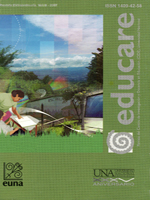Sistematización de resultados del Programa de Mejoramiento Cualitativo de la Educación en Institutos Técnicos Profesionales de Costa Rica
DOI:
https://doi.org/10.15359/ree.2-Ext.3Keywords:
qualitative improvement, educationAbstract
This article shows results obtained in the Program of Qualitative Improvement of Education in Costa Rican Technical Institutes of five different regions: North Region, Limon, South Region, Central Pacific (Aguirre) and Santa Cruz.
This experience was designed at the Technical Institutes as a pilot project, developing situational diagnoses and interventional action plans for the improvement, specially, of infrastructure and didactic equipment. Subsequently, a planning stage of verification, curriculum development and tactic planning was carried out. This is a methodological proposal for the qualitative improvement of education in these Technical Professional Institutes.
References
Ackof, R.; Vergara, E.; Jamshid, G. (1986). Guía para controlar e/futuro de la empresa.
México: LIMUSA.
Aldana, E. (s.f.). Guía instruccional. Universidad de Los Andes, SAGE.
Blanchard, K. (1997). Administración por valores. Bogotá, Colombia: Norma.
Borges, J.; Escobar, M.; Palomino, J.; Saldaña, R.; De Souza, J. (1995). Planificación
estratégica en la administración de la investigación agropecuaria.
Fascículo 2. Netherlands: ISNAR.
Bowman, C. (s.f.). La esencia de la administración estratégica. s. n. t.
Castelán, B. ( 1985). Planeación estratégica y control de gestión. México: ECASA.
Cedeño, A. (1993). Administración de la empresa. San José, Costa Rica: EUNED.
Drucker, P. (1995). Gerencia para el futuro. Bogotá, Colombia: Norma.
Grouard, B. y Meston, F. (1996). Reingeniería del cambio. México: ALFAOMEGA.
Hamel, G. y Prahalad, C. (1995). Compitiendo por el futuro. Barcelona, España:
Ariel.
Harrington, H. (1993). Mejoramiento de los procesos de la empresa. Bogotá, Colombia:
Me Graw Hill.
Hernández, S. (s.f.). Los retos de la dirección universitaria en la década de los 90.
La Habana: Instituto Superior Politécnico José A. Echeverría.
Morgan, G. (1995). Images of organization. California: SAGE.
Morrisey, G. (1996). Planeación estratégica. México: Prentice Hall.
Morrisey, G. (1996). Planeación táctica. México: Prentice Hall.
Muñoz, C. ( 1995). Análisis y propuestas para la planeación educativa. Washington:
OEA.
Ogliastri, E. ( 1985). Manual de planificación estratégica. Bogotá, Colombia: Tercer
Mundo.
Ohmae, K. (1989). La mente del estratega. México: Me Graw Hill.
Pfeiffer, W.; Goodstein, L.; Nolan, T. (1989). Shaping strategic planning. Frogs,
dragons, bees and turkey tails. Illinois, U.: Scott Foreman.
Ramírez, E. (1995). Hablemos de gerencia: un enfoque faturista. San José, Costa
Rica: Alma Máter.
Sallenave, J. (1985). Gerencia y planeación estratégica. Bogotá, Colombia: Norma.
Senge, P. (1992). La quinta disciplina. Barcelona, España: GRAMICA.
Senge, P. (1995). La quinta disciplina en la práctica. Barcelona, España: GRAMICA.
Senge, P. (s.f.). La danza del cambio. Barcelona, España: GRAMICA.
Published
How to Cite
Issue
Section
License
1. In case the submitted paper is accepted for publication, the author(s) FREELY, COSTLESS, EXCLUSIVELY AND FOR AN INDEFINITE TERM transfer copyrights and patrimonial rights to Universidad Nacional (UNA, Costa Rica). For more details check the Originality Statement and Copyright Transfer Agreement
2. REUTILIZATION RIGHTS: UNA authorizes authors to use, for any purpose (among them selfarchiving or autoarchiving) and to publish in the Internet in any electronic site, the paper´'s final version, both approved and published (post print), as long as it is done with a non commercial purpose, does not generate derivates without previous consentment and recognizes both publisher's name and authorship.
3. The submission and possible publication of the paper in the Educare Electronic Journal is ruled by the Journal’s editorial policies, the institutional rules of Universidad Nacional and the laws of the Republic of Costa Rica. Additionally, any possible difference of opinion or future dispute shall be settled in accordance with the mechanisms of Alternative Dispute Resolution and the Costa Rican Jurisdiction.
4. In all cases, it is understood that the opinions issued are those of the authors and do not necessarily reflect the position and opinion of Educare, CIDE or Universidad Nacional, Costa Rica. It is also understood that, in the exercise of academic freedom, the authors have carried out a rogorous scientific-academic process of research, reflection and argumentation thar lays within the thematic scope of interest of the Journal.
5. The papers published by Educare Electronic Journal use a Creative Commons License:














 The articles published by Educare Electronic Journal can be shared with a Creative Commons License:
The articles published by Educare Electronic Journal can be shared with a Creative Commons License: 



